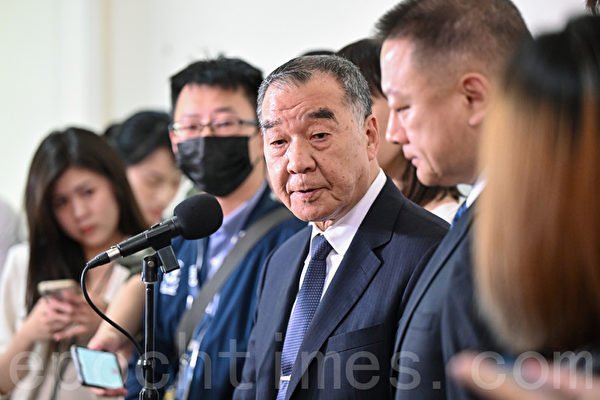On April 16th, Huang Shuguang, a member of the National Security Council and the head of the domestic submarine project, submitted his resignation to President Tsai Ing-wen. Defense Minister Chiu Kuo-cheng stated on the 17th that the domestic submarine project is a team effort and that Huang’s personal decision will not cause any issues.
The Legislative Yuan’s Foreign Affairs and National Defense Committee invited Defense Minister Chiu Kuo-cheng to report on the “Evolution and Current Progress of the Domestic Submarine Construction Project” and be prepared for questioning. Chiu Kuo-cheng, in a media interview before the meeting, acknowledged Huang Shuguang’s diligence and professionalism in his work. He mentioned that he had learned a lot from working with Huang, stating that Huang’s resignation process was respected, and he could empathize with the feelings expressed in Huang’s statement.
In his resignation statement, Huang Shuguang emphasized that the domestic submarine construction project has been a consistent policy of successive administrations. However, he had endured baseless accusations, serious defamation, and attacks intended to confuse public perception over the past 7 to 8 years. He expressed his inability to tolerate individuals attacking and undermining the enhancement of national defense capabilities and tarnishing the reputation and morale of the military.
Minister Chiu noted that Huang Shuguang’s adjustment process likely reflects his mental and physical exhaustion. However, in terms of the overall submarine project, the Defense Ministry will continue to assess the situation. Fortunately, the team behind the project operates cohesively, ensuring that Huang’s resignation will not impede progress.
Chiu Kuo-cheng stressed that the submarine project is a significant undertaking, with team members including active-duty military personnel who are committed to the project’s success. The change in leadership will not hinder the project’s development and implementation.
During the questioning session, Legislator Lin Chu-yin raised concerns regarding media reports suggesting that the budget for the building of 7 subsequent submarines exceeds NT$280 billion (approximately 90.2 billion US dollars), with a higher average unit cost compared to the prototype ship Hai Lung. Chiu emphasized the complexity of the budget breakdown and the necessity to communicate transparently with the public while preserving confidentiality concerns.
Lin Chu-yin pointed out the pressures faced not only by project leaders but also by engineers and suppliers involved in the submarine project. She advocated for an increase in the self-sufficiency rate of domestic submarine construction.
Minister Chiu expressed confidence in the project team’s ability to manage supplier concerns, citing accumulated experience in addressing such challenges. He emphasized the importance of open communication in resolving issues and highlighted the technological advancements and talent cultivation fostered by the submarine construction project.
Vice Admiral Shao Wei-yang of the Defense Ministry stated that Taiwan Shipbuilding Corporation Chairman Cheng Wen-long aspires for the self-sufficiency rate in submarine construction to reach 50%, in line with the spirit of national defense autonomy.
During the questioning, Legislator Ma Wen-chun inquired about the estimated budget of NT$280 billion for the submarines. Vice Admiral Qiu Jun-rong of the Navy declined to comment, indicating that the overall assessment is still ongoing, and specific figures are subject to further review.
Legislator Lai Shi-bao raised concerns about the schedule for the Harbor Acceptance Test (HAT) and Sea Acceptance Test (SAT) of the Hai Lung-class submarine. Vice Admiral Shao Wei-yang clarified that the submarine is currently undergoing harbor testing and that there is no definitive timeline for sea trials.
Lai Shi-bao also inquired about the delivery timeline and combat capability of the Hai Lung-class submarine. Shao Wei-yang expressed hope to deliver the submarine to the Navy by next year (2025) with full combat capabilities, pending successful completion of the HAT and SAT.
Regarding the adequacy of 8 domestically constructed submarines (1 prototype Hai Lung submarine and 7 planned production submarines) for safeguarding the Taiwan Strait’s security, Shao Wei-yang emphasized the need to evaluate overall naval capabilities before retiring the existing 2 Hsun Hai-class submarines, which may exceed 40 years of service. Minister Chiu also stressed the importance of continuously upgrading and replacing aging equipment to maintain a strong national defense.
Editor: Ye Ziwei

